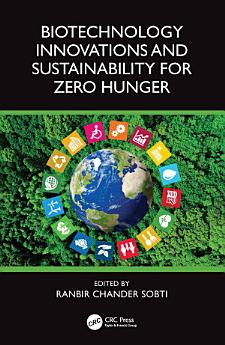Biotechnology Innovations and Sustainability for Zero Hunger
About this ebook
Key Features:
- Covers cutting-edge biotechnological technologies for sustainable agriculture, providing solutions to address global hunger and achieve the goal of zero hunger
- Discusses various crop improvement techniques, including genetic engineering and genetically modified organisms
- Focuses on biotechnological interventions for enhancing crop productivity and nutritional value to improve food availability and quality
- Presents a detailed discussion of crop protection strategies and disease resistance mechanisms
- Provides a thorough examination of advanced technologies for improving animal-based foods and technology-based artificial meat
- Examines the application of biotechnological techniques in developing innovative food systems for reducing food waste
About the author
Professor Ranbir Chander Sobti is an Emeritus Professor at the Indian National Science Academy (INSA), New Delhi, and an Honorary Scientist at Panjab University, India. He is the Former Vice‐Chancellor of the Punjab University, Chandigarh, and Babasaheb Bhimrao Ambedkar University (Central University), Lucknow, India. He started his career as a cytogeneticist and then moved on to molecular biology, including genomics, to understand the susceptibility and disease process of cancer, chronic obstructive pulmonary disease, acquired immunodeficiency syndrome, metabolic syndrome, and kidney diseases. Professor Sobti has also used stem cells and nanoparticles to understand the process of tissue organ development through a designed de‐cellularisation protocol. He has published more than 350 research articles in journals of international repute and has also published about five dozen books. Professor Sobti is a Fellow of the Third World Academy of Sciences; the National Academy of Sciences, India; the INSA; the National Academy of Medical Sciences; the National Academy of Agricultural Sciences; the Canadian Academy of Cardiovascular Diseases; and a few others. He was the General President of the Indian Science Congress for the 102nd session held at the University of Jammu, India, in 2013. He is the recipient of many prestigious awards including the INSA Young Scientist Medal, UGC Career Award, Punjab Rattan Award, JC Bose Oration and Sriram Oration Awards, and Lifetime Achievement Awards of the Punjab Academy of Sciences, Zoological Society of India, and the Environment Academy of India. He is a recipient of the prestigious Padma Shree award from the Government of India in 2009 for his outstanding contributions to education.






